October 6, 2024
Closing Joint Venture agreement with Rangeland Engineering, Calgary Alberta Calgary (CA) & Oslo (NO) – 6th of September 2024 – Carbon Circle AS and Rangeland Engineering Canada Corp. announce formalization of a joint venture agreement to provide decarbonization solutions and services in Canada. The newly formed Carbon Circle | Rangeland Joint Venture Ltd. will integrate extensive Carbon Capture and Storage (CCS) expertise with proven Engineering, Procurement and Construction (EPC) project execution methods along with local insight and knowledge to bring carbon capture solutions to the Canadian and international markets; efficiently, effectively and more economically. An organization dedicated to the carbon capture market in Alberta will be established with location Calgary (CA) based on secondment of Norwegian carbon capture experts and project resources from the Rangeland base organization. Carbon Circle brings commercialization of a wide portfolio of modularized IP designs for post combustion carbon capture over a variation of technologies. Our designs are applicable to a wide range of industries and are considered enablers for our ambitions to partake and invest in project developments within the full CCS value chain from capture to sequestration. Rangeland Engineering is a full-service engineering, procurement and construction management (EPCM) company based in Western Canada and brings full access to approx. 200 engineers with a drive to develop new and innovative ways to solve challenges, meet regulations and increase productivity. Carbon Circle achieved a major milestone in August 2024 by delivering the first offshore carbon capture system, to be placed on a production ship in West Africa, providing a great momentum when expanding into Canada. “We have identified Canada, and specifically the province of Alberta, as one of the most interesting areas globally to successfully implement large scale CCS. The industry is ready, and the framework around CCS is well developed through strong incentive programs. Our mission is to make carbon capture feasible at an acceptable cost, minimizing risk for our clients, and the expansion into Alberta is for us the right step on this mission”, Kristian Kjæstad, SVP Engineering in Carbon Circle. Carbon Circle | Rangeland Joint Venture Ltd. offerings will also include project structuring and development, financing, feedstock- and offtake agreements in addition to EPC services. Carbon Circle | Rangeland Joint Venture Ltd. Suite 300 - 550, 11 Ave SW Calgary, AB T2R 1M7 https://carboncircle.com Contacts: Kristian Kjæstad – SVP Engineering Chet Anand – Director of Sales Canada Cell: +47 414 42 895 Cell: +1 403 542 5234 kristian@carboncircle.com chet.anand@carboncircle.com About Carbon Circle Carbon Circle is a carbon removal and energy EPC specialist supporting clients across a broad range of industries to develop and execute their decarbonization strategies. Carbon Circle offers end-to-end carbon abatement solutions, from initial analysis and planning to EPC and plant delivery - over the entire CCS value chain. We combine our extensive experience in modularized process solutions with CCS competency, ensuring safe, cost-efficient and low-risk project execution. Carbon Circle’s headquarter is located in Oslo, Norway, and by entering the JV agreement with Rangland Engineering, there will be full access to local EPC services and capacities out of Calgary, Alberta. About Rangeland Engineering Rangeland Engineering is a full-service engineering, procurement and construction management (EPCM) company based in Western Canada. Through our client partnerships, industry experience, and use of technology, we’re developing new and innovative ways to solve challenges, meet regulations and increase productivity. Rangeland Engineering support the entire project lifecycle - from feasibility studies to detailed engineering design to commissioning and start-up. Our complete engineering services include process, pipeline, mechanical, piping, civil, structural, electrical, and instrumentation & control disciplines plus full procurement services. Throughout all project phases, our engineers partner with clients to simplify process, reduce costs and waste, improve constructability, ensure reliability and optimize design.




